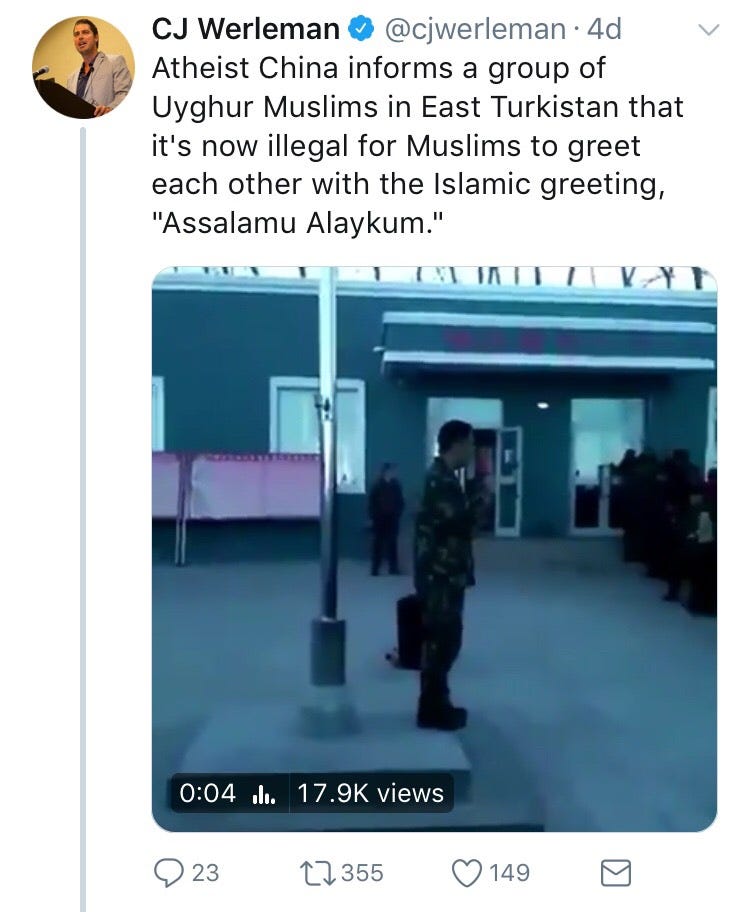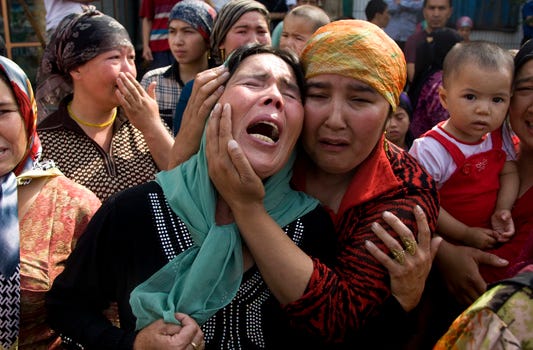Uyghur Muslims: Victims of the World’s Largest Ethnic Cleansing
Uyghur Muslims: Victims of the World’s Largest Ethnic Cleansing.
(Pic via Radio Free Asia)
China is carrying out a systematic campaign to ethnically cleanse up to 15 million Uyghur Muslims in Xinjiang, or rather what was East Turkistan until China began occupying and colonizing the region in 1949.
Moreover,
China is sparing no effort to eradicate any memory or proof of Uyghur
Muslim life. It is truly the stuff of dystopian nightmares, or a
reenactment of the worst genocides carried out in the previous century.
The handful of personal accounts that trickle out from behind China’s
total control of the Internet and the media invoke memories of the
Communist state’s darkest days — the period of the “Cultural
revolution,” when religious people and sites were wiped from the
country’s landscape.
For
much of the 1970s and 80s, however, an increasingly open China softened
its stance towards its religious and ethnic minorities, but this
relative “openness” provided the space for minorities to express their
economic, political, and religious grievances. When Uyghur Muslims
renewed calls for a return to their independence, a status they enjoyed
briefly as a sovereign state in the 1940, then known as the East
Turkistan Republic, and as former neighboring Soviet states realized
independence, China, fearing a growing separatist movement on its
western frontier, began its crackdown on Xinjiang in the late 1990s.
China’s
crackdown turned increasingly vicious when the United States declared
its “War on Terrorism” in 2001, with China seizing the opportunity to
erroneously portray Uyghur Muslims as one-part of the global Islamic
insurgency, going so far to tie Uyghur nationalist dreams with the goals
of the terror group al-Qaeda. In doing so, China gambled that it could
pretty much do whatever it pleased to Uyghur Muslims, so long as it
could dupe Western states into believing it, too, was at war with
“radical Islam.” It’s
the exact same kind of manipulative ploy successfully deployed by
Israel, insofar as the manner the Jewish state mischievously conflates
the Palestinian liberation struggle with “Islamic terrorism,” so it’s
not like China needed to reinvent the proverbial wheel.
What began as a crackdown, however, has morphed into arguably the world’s largest state sponsored campaign of ethnic cleansing.
China
has banned any form of expression of Islam in East Turkistan, forcing
Uyghur Muslims to publicly denounce their faith and swear allegiance to
the Communist state. Recently I posted on Twitter a video
of Chinese authorities informing a group of Uyghur Muslims that it is
now illegal for them to greet one another with the Islamic greeting,
“Assalamu Alaykum.”

Islamic texts are also banned, including the Quran, as are beards that appear “abnormal,” i.e. too Muslim-y. Last year, China published a document titled, “Naming Rules for Ethnic Minorities,” which prohibits names associated with Islam, including Medina, Islam, Imam, Medina, Hajj, and others.
“In
setting limits on the naming of Uyghurs, the Chinese government is in
fact engaging in political persecution under another guise,” Dilxat
Raxit, spokesman for the exile World Uyghur Congress group, told Radio Free Asia. “They are afraid that people with such names will become alienated from Chinese policies in the region.”
These are just a sample of a new tranche of restrictive and discriminatory measures
that have come into force for those living in the region. Uyghur
Muslims are now required by the government to have tracking devices
installed on their cars and mobile phones.
But
baby names, beards, and tracking devices are the least of problems
faced by Uyghur Muslims in the face of brutal Chinese oppression,
however. Torture, imprisonment, state sanctioned murder and forced
disappearances have become the new reality in the Xinjiang area.
According to reports
from human rights watchers, China has ordered its officials in Xinjiang
to send almost half of its population to “re-education camps,”
otherwise known as forced labor and indoctrination camps, the kind long
associated with North Korea.
“We target people who are religious…for example, those who grow beards despite being young,” one Chinese government officer admitted in a report.
When I spoke
to Abdugheni Thabit, a Uyghur Muslim journalist who now resides in The
Netherlands, he told me that up to 1 million of his people are now in
what he calls “prison camps.” Steven Zhang, a Hui Muslim who now lives
in Houston, Texas, and who is suing the Chinese government for the
murder of his Uyghur Muslim wife, described Thabit’s figure as “very
conservative,” claiming, “Within the last 5 years at least 5 million Uyghurs were detained or secretly disappeared.”
Forced disappearances have become a notable and alarming trend in the past year or two. According to Chinese Human Rights Defenders,
Chinese security forces have forcibly disappeared at least 26
journalists, writers, bloggers, and human rights activists alone.
“Victims
are often violently abducted, denied their right to due legal process
and contact with loved ones or lawyers, and are at high risk of torture
while in custody,” observes The Uyghur American Association.
All
of which is happening out of the gaze of the international community,
thanks largely to China’s control of the Internet and social media.
Thabit told me he hadn’t heard from his Uyghur Muslim family in East
Turkistan since 2009 as China controls all form of communication coming
out of the area. All he knows is they were still alive in 2014, the year
his sister, who lives in Washington DC, visited. Again, parallels to
North Korea come to mind.
The situation in Xinjiang has “further deteriorated,” according to a statement issued by the US Congressional Executive Commission on China (CECC) earlier this month.
“Civilians
are detained without cause, ‘political education’ camps proliferate,
and a vast surveillance apparatus invades every aspect of daily life.
These rights violations are deeply troubling and risk serving as a
catalyst for radicalization,” said CECC chairman Sen. Marco Rubio
(R-FL).
Adding
to the woes of Uygur Muslims is the absence of a friend anywhere in the
international system. Traditional allies Turkey and Pakistan have been
brought into China’s sphere of economic influence, and wealthy Gulf Arab
states are too preoccupied with Iran, Qatar, or both.
If
history is a guide, and should the existential woes of the Uyghur
Muslims continue to fall on the disinterested ears of the international
community, then one can be sure that where Chinese “re-education” and
“assimilation” programs fail, mass extermination will likely follow.
Source:


Post a Comment